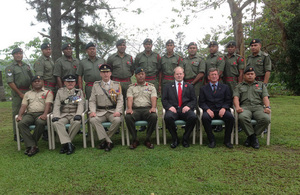British Government sponsored training for Fiji Military
Speech by Acting High Commissioner Mr Daniel Salter to mark the renewal of UK-Fiji military cooperation following the election in September

Acting High Commissioner Daniel Salter with officials and participants of the Psychology of Leadership Course
RFMF Commander Land Forces Colonel Kalouniwai, the Director of Training Operations and to all the RFMF personnel gathered here this morning, vinaka vaka levu for your warm welcome.
I am very pleased to be here today on the first day of these courses that represent the initial stages in UK-Fiji military cooperation since the election in September. Indeed, the last time I was in this building was to see for myself the election process as a member of the Multilateral Observer Force. Today, we are fortunate to have the lead instructor from Sandhurst, Retired Colonel Mr Ronnie McCourt, to present courses on the Psychology of Leadership and on Media Operations. We also have two top drill instructors from the Scots Guards and Grenadier Guards who will literally be putting you through your paces – and we look forward to watching the drill competition between the two classes next Friday. I am sure that all 72 students will benefit enormously from the experience over the next two weeks.
Fiji plays an important international role. RFMF troops on peace-keeping duties provide a bulwark in some of the most difficult theatres of operation in the world. Fijian troops are respected for their professionalism and tenacity, but also for their ability to win over local populations. The UK is grateful for your contribution. And we of course remain thankful for the release of the 43 Fijian troops serving as part of UNDOF.
The UK is deeply committed to Fiji. We have assisted where requested on the recent transition to democracy, for example by providing training manuals for the police force, election data management systems and training for parliamentary reporting. But there is a special link between the UK and Fijian armed forces. Fifty-three years ago this month, the first 212 Fijians were recruited into the British Army - and there are still around 1800 Fijians serving in the British armed forces today. They represent the largest contingent of Commonwealth personnel in the army and make a major contribution to UK defence objectives.
Our British Army Support Office here in Suva has helped to establish a Welfare Centre for serving and former personnel and their families, which will open officially next week. The UK Prime Minister, David Cameron, has taken a personal interest in the creation of this Centre and we are very grateful for the assistance provided by the Government of Fiji to realise this project.
In closing, I would like to thank the instructors who have travelled out from the UK and our Defence Advisor, Lt Col Woodman, based in Wellington for their combined efforts. I would also like to thank the Commander of the RFMF, Brigadier Tikoitoga, and the Director of Training (name) for their assistance in bringing about this next phase in our military cooperation. But most of all, I would like to thank you, the students, for your enthusiastic participation on the various courses: this will benefit Fiji, but it will also benefit you personally and professionally. I wish you all the best of luck.
Vinaka vaka levu.